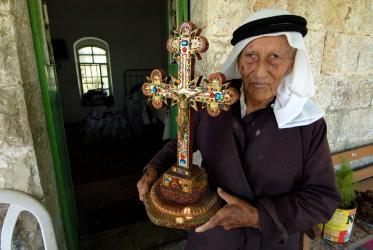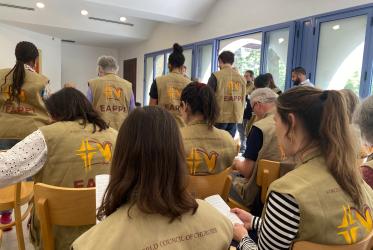I was a young man when I first submitted the residency application for my wife, but not knowing that my entire life, year after year, will be dominated by the struggle to remain a family together in the same place—a status not taken for granted by many Palestinians from East Jerusalem.
When I first submitted the application, I received a brief letter of basically one-and-a-half lines. It said that the application was rejected for “security reasons.” I immediately thought, if the state institutions have security issues against us, then they can easily have us arrested, but since they did not, the claim is totally unsubstantiated. I had to hire a lawyer, and to pay a huge sum at the time—$3,000—so the lawyer would talk to the Interior Ministry and have the ministry review the application.
I remember a time when my wife and I were newlywed, and she did not have the right to reside in Jerusalem, so she stayed in Ramallah while I stayed in Jerusalem. It turned out that this was only the tip of the iceberg.
When I was allowed to resubmit the application, I had to stand in line in front of the Interior Ministry at 3:30 am, due to the huge crowds, and because the office admitted the last group at 7 am.
I stood in line, time and again, whenever a document was requested from me, and whenever I was given an appointment to review the application. I remember the time when it became 7 am and I was turned back, and had to come again the next morning to try my luck.
I remember the time when I was pushed by the security officers against a metal barrier, and I went home with my back bruised. I remember a time when I made it into the office, only to have the clerk sitting there shout at me. I could not take it anymore, and I asked to see the manager because I wanted to file a complaint. I told him that I had been waiting in line since 3:30 am, in the midst of the shoving and security checks, and the last thing I expected at his office was a clerk who shouted at me. He spoke excellent Arabic, he listened and was polite and compassionate, and was unhappy about the situation but it seemed there was nothing he could do to help me.
I remember when my eldest daughter was born. I was told at the Interior Ministry that she cannot receive a Jerusalem ID for “security reasons.” It was a struggle to get her registered and to receive an ID card. Now she is a college graduate, but we still have a temporary status for her mother.
The worst of all incidents, that I will never forget, when they gave us an appointment and it was three months in advance. We were elated; we had an appointment! We started preparing our file and collecting every shred of evidence that we are living in Jerusalem: telephone bills, water bills, electricity bills, letters from our employers, tax documents, and children’s school certificates. A few hours before the appointment, my mother died, so I asked my wife to take the file and to go the Interior Ministry. There, they asked her about my whereabouts. My wife said, “He cannot come because his mother had just died.” They insisted that I come, and I had to leave my dead mother and go there.
Nowadays the entry arrangements have eased up and the office moved to a larger space, and there is an online system for reservations. Still, it takes a long time to get an appointment. Nothing has changed at the policy level, and getting a Jerusalem ID for a Palestinian remains a dream.
After all those years and long struggle, my wife has a temporary status in Jerusalem. We renew the status each year but it can be rescinded anytime. To travel to Jordan, we go through separate lanes and meet again abroad, and to travel through the airport I go by myself because my wife is not allowed to. Our children travel with me, not with their mother, because they have Jerusalem IDs. Most likely, my wife will never be allowed to stay with her husband and children in Jerusalem peacefully.
According to Hamoked Israeli human rights organization, approximately 13,000 families in East Jerusalem and Israel have one spouse who only has a temporary permit due to the ban on family unification. The overwhelming majority of these families are living in East Jerusalem.
The “Citizenship and Entry into Israel Law” passed by the Knesset, the Israeli parliament, on 31 July 2003, froze the family unification rights for thousands of Palestinian families of which one of the spouses is a Jerusalem resident or a Palestinian citizen of Israel. The law has caused anguish and deterioration of life conditions for large sectors of the Palestinian community in East Jerusalem. Demographics were openly discussed during the debates over the law. Beside all security concerns, the law aims clearly at limiting the demographic presence of Palestinians within Israeli territory, particularly within the illegally annexed East Jerusalem.






